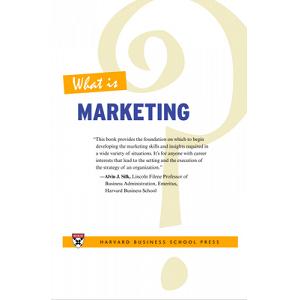Marketing -- Organizational function that manage a set of processes (i.e. to create, communicate and deliver value to customers in addition to managing relationship with them) so that the organization and its stakeholders will get the benefit (usually in profit).In short, organizational attempts to meet customers’ needs with profit.
Examples of customers’need:
–McDonald’s –need for fast food
–Google –need for information, communication
–L’oreal–need for beauty, self confidence
–FAB –need for cleanliness, hygiene
Definition of Marketing
The American Marketing Association (AMA) defines marketing as "the activity, set of institutions, and processes for creating, communicating, delivering, and exchanging offerings that have value for customers, clients, partners, and society at large"1
3
. This definition emphasizes the importance of value creation and the relationships between various stakeholders in the marketing process.Key Components
1. Understanding Customer Needs
At its core, marketing involves identifying and satisfying customer needs. This includes conducting market research to understand consumer preferences and behaviors2. Creating Value
Marketing is about delivering value through products or services that meet the demands of consumers. This involves not only the tangible aspects of a product but also the overall experience associated with it3. Communication
Effective communication is crucial in marketing. It involves crafting messages that resonate with target audiences through various channels, including advertising, social media, and public relations4. Exchange Process
Marketing facilitates exchanges between businesses and consumers. This process includes not just the sale of products but also the ongoing relationship that develops between consumers and brandsThe Marketing Mix: The Four Ps
A fundamental concept in marketing is the marketing mix, often referred to as the Four Ps:| Element | Description |
|---|---|
| Product | The goods or services offered to meet customer needs. |
| Price | The amount charged for the product, which influences demand and profitability. |
| Place | The distribution channels used to deliver the product to consumers. |
| Promotion | The activities that communicate the product's benefits and persuade customers to purchase it. |
Evolution of Marketing
Marketing has evolved significantly over time. Initially focused on simple transactions, modern marketing emphasizes building long-term relationships with customers. This shift reflects changes in consumer behavior and technological advancements that allow for more personalized marketing approachesDigital Marketing
With the rise of digital platforms, marketing strategies have expanded to include online channels such as social media, email marketing, and search engine optimization (SEO). These tools enable businesses to reach wider audiences and engage with them more effectivelyReference: Marketing Management slide by Nabsiah Abdul Wahid, Ph.D

No comments:
Post a Comment